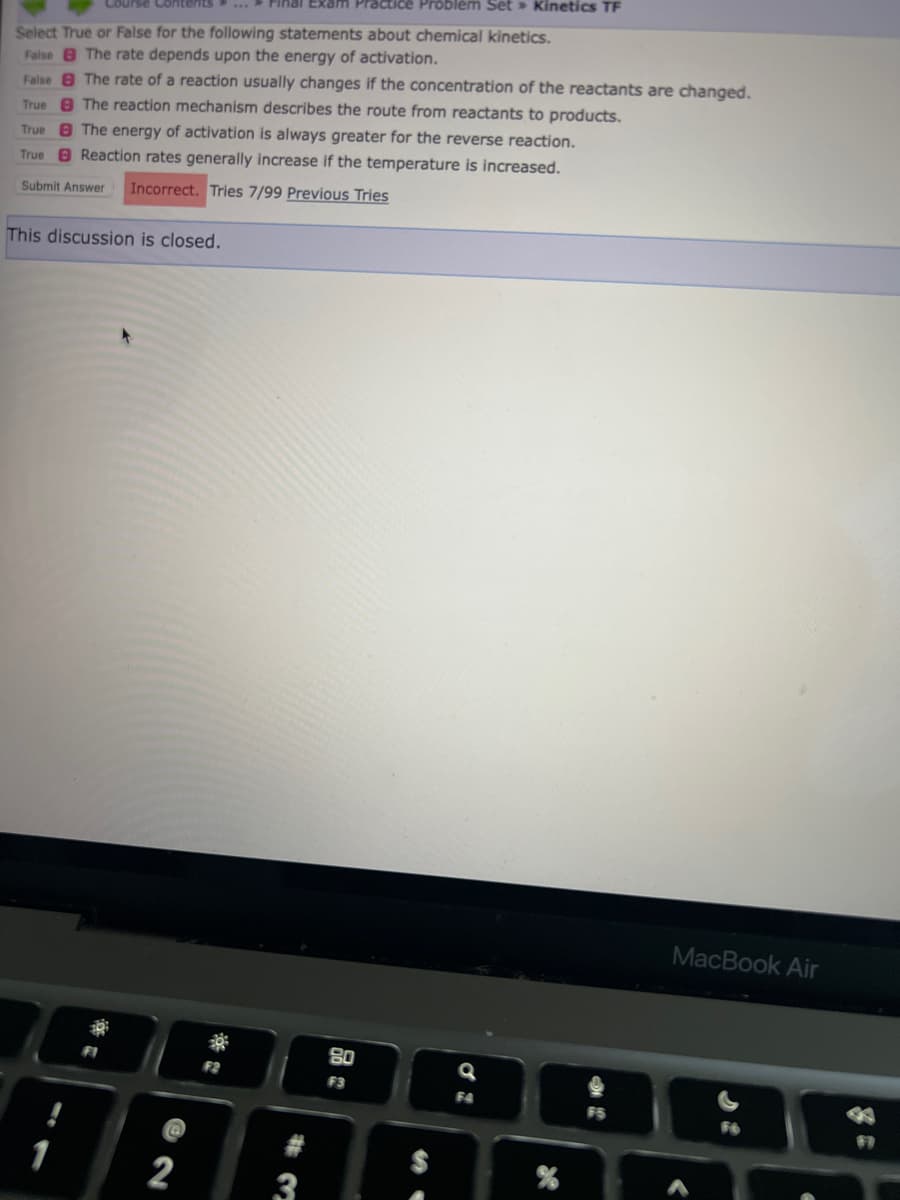tents Exam Practice Problem Set» Kinetics TF Select True or False for the following statements about chemical kinetics. False The rate depends upon the energy of activation. False True The rate of a reaction usually changes if the concentration of the reactants are changed. The reaction mechanism describes the route from reactants to products. The energy of activation is always greater for the reverse reaction. True True Reaction rates generally increase if the temperature is increased. Submit Answer Incorrect. Tries 7/99 Previous Tries This discussion is closed.
tents Exam Practice Problem Set» Kinetics TF Select True or False for the following statements about chemical kinetics. False The rate depends upon the energy of activation. False True The rate of a reaction usually changes if the concentration of the reactants are changed. The reaction mechanism describes the route from reactants to products. The energy of activation is always greater for the reverse reaction. True True Reaction rates generally increase if the temperature is increased. Submit Answer Incorrect. Tries 7/99 Previous Tries This discussion is closed.
Chemistry: Principles and Reactions
8th Edition
ISBN:9781305079373
Author:William L. Masterton, Cecile N. Hurley
Publisher:William L. Masterton, Cecile N. Hurley
Chapter11: Rate Of Reaction
Section: Chapter Questions
Problem 35QAP: Azomethane decomposes into nitrogen and ethane at high temperatures according to the following...
Related questions
Question
Select true or false for the following statements about chemical kinetics .

Transcribed Image Text:Course Contents
Select True or False for the following statements about chemical kinetics.
False The rate depends upon the energy of activation.
False The rate of a reaction usually changes if the concentration of the reactants are changed.
True The reaction mechanism describes the route from reactants to products.
TrueThe energy of activation is always greater for the reverse reaction.
True Reaction rates generally increase if the temperature is increased.
Submit Answer Incorrect. Tries 7/99 Previous Tries
This discussion is closed.
30
2
Final Exam Practice Problem Set » Kinetics TF
F2
3
80
F3
Q
F4
MacBook Air
*
#1
Expert Solution
This question has been solved!
Explore an expertly crafted, step-by-step solution for a thorough understanding of key concepts.
This is a popular solution!
Trending now
This is a popular solution!
Step by step
Solved in 4 steps

Knowledge Booster
Learn more about
Need a deep-dive on the concept behind this application? Look no further. Learn more about this topic, chemistry and related others by exploring similar questions and additional content below.Recommended textbooks for you

Chemistry: Principles and Reactions
Chemistry
ISBN:
9781305079373
Author:
William L. Masterton, Cecile N. Hurley
Publisher:
Cengage Learning


Chemistry for Engineering Students
Chemistry
ISBN:
9781337398909
Author:
Lawrence S. Brown, Tom Holme
Publisher:
Cengage Learning

Chemistry: Principles and Reactions
Chemistry
ISBN:
9781305079373
Author:
William L. Masterton, Cecile N. Hurley
Publisher:
Cengage Learning


Chemistry for Engineering Students
Chemistry
ISBN:
9781337398909
Author:
Lawrence S. Brown, Tom Holme
Publisher:
Cengage Learning

Introduction to General, Organic and Biochemistry
Chemistry
ISBN:
9781285869759
Author:
Frederick A. Bettelheim, William H. Brown, Mary K. Campbell, Shawn O. Farrell, Omar Torres
Publisher:
Cengage Learning

Chemistry: The Molecular Science
Chemistry
ISBN:
9781285199047
Author:
John W. Moore, Conrad L. Stanitski
Publisher:
Cengage Learning

Chemistry: Matter and Change
Chemistry
ISBN:
9780078746376
Author:
Dinah Zike, Laurel Dingrando, Nicholas Hainen, Cheryl Wistrom
Publisher:
Glencoe/McGraw-Hill School Pub Co